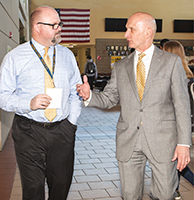
Three Common-Sense Principles to Share With Principals
BY ROBERT A. RAMMER/
School Administrator, June 2018

|
Robert Rammer (right) with Matt Biscan, principal of Wheaton North High School in Illinois.
|
Few things are more frustrating or challenging for a superintendent than hiring a principal who appears to possess all the requisite qualities of an effective educational leader only to see him or her stumble over common-sense mistakes.
Often as school administrators, we are so focused on the big picture that we forget about the little things that can sabotage our efforts. The expression “Elephants don’t bite; it’s the mosquitoes that will get you” fits this circumstance. What counsel can superintendents give to their districts’ site administrators to steer them away from the pesky mosquitoes?
During my 16 years as an assistant superintendent in two districts in charge of hiring and supervising principals, I’ve settled on three simple ideas that can help us watch our steps.
» Beware of e-mail. Talking is always best.
Although e-mail, texting, social media and the like can be efficient for communicating, the potential harm often outweighs the benefits when the subject has the slightest bit of sensitivity. We sometimes say things in an electronic medium that we would not say in person.
While it may be much easier to sit at your desk and send an e-mail to a teacher down the hall, consider the better impact you could have by getting up and visiting that classroom. You might encounter another teacher on the way. (Bonus: You also get in some physical exercise, something we all need more of.)
Accepting that electronic communication is not disappearing, keep in mind that whatever you write in an e-mail: (1) will be permanent; (2) will not be private (and most likely will be shared with others; (3) can be misunderstood; (4) will possibly be used to judge your writing and communication skills; and (5) might land in the local news media as the basis of a story without your permission.
» You are working 24/7 whether you think so or not.
When you become a principal, you have agreed to lose some of your personal privacy. It goes with the position. People no longer will look at you the same as they did before you accepted this leadership position. Everything you do at work, at home or in the community will be scrutinized whether or not you think you are wearing your “principal hat.”
When you run to the grocery store on Saturday morning and bump into a parent or student, you’re still the principal. When you go to a neighborhood barbeque, you’re seen as the principal and individuals will judge you and what you say through that lens.
Does this mean you need to dress up to mow the lawn or refrain from a glass of wine when dining out? Of course not. It does mean you must be aware of others’ perceptions of you. You are now a public figure, an ambassador for your school and the profession, 24 hours a day, seven days a week. If you want others to understand that education is a profession, you must portray that image as the principal.
» Sweat the little things. The details of your job can be the measure of your success or failure.
Sometimes principals get caught up on the vision of their job and forget the little details that keep their school and the system running. Inattention to the little details, those unglamorous aspects of the job, is what derails an operation or diminishes staff members’ support for their leader. Not getting expected classroom supplies ordered on time for the start of school year would greatly stress teachers. Forgetting to sign the transportation order for a field trip bus would surely upset children, parents and teachers.
Ensuring the details of running a school are taken care of is comforting to staff. It makes their jobs easier and enables them to concentrate on student learning. One caution: Many of these details are embedded in the paperwork and bureaucracy of a school that is usually managed in the principal’s office, behind a desk. Avoid being trapped there. You must be visible to students, staff and parents. Do the paperwork when everyone is gone or when you get home.
ROBERT RAMMER is assistant superintendent of Community Unit School District 200, Wheaton, Ill.